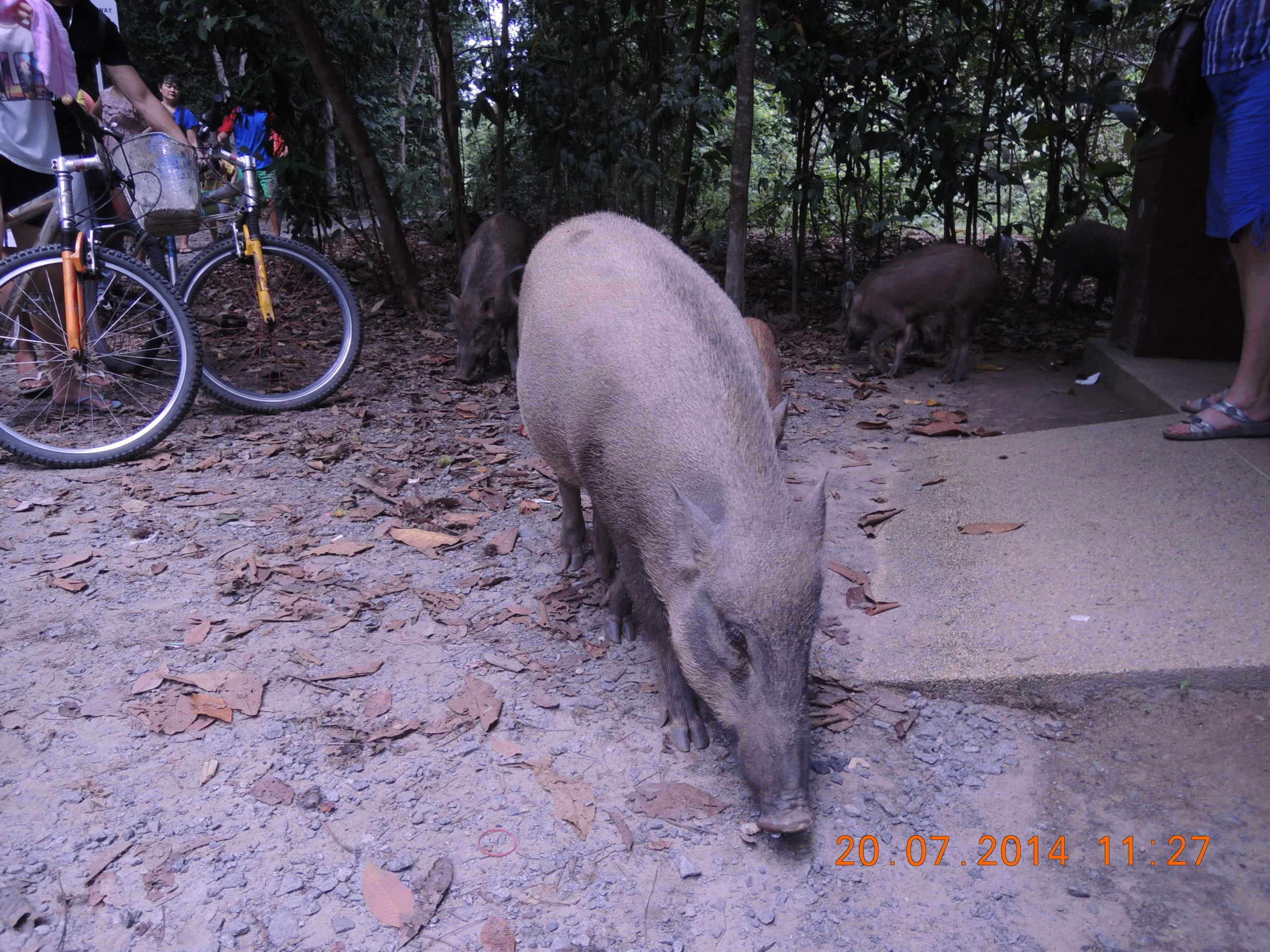Off the east coast of Singapore is a small island, Pulau Ubin, which means Granite Island. People take a ferry—called a bumboat—out to the island, rent bicycles, pedal to a nature reserve, and get an idea of how wild and unkempt Singapore was before modern vision conquered the landscape.
I asked someone who’d recently made the trip if a couple of women with hip and knee replacements could manage the ride from the jetty to the reserve—“Oh yes,” she said. “Easy-peasy, nothing to it.” My sister, Resi, and my cousin, Georgia, are from northern elevated climates, unused to the hot oxygen-laden humidity in this part of the world. And their lower limbs are more machine than human.
After five minutes of pedaling up a mild slope, they’re a frightening shade of puce, huffing and dripping. Sweat mats Georgia’s curls to her head. I’m not used to seeing Georgia with an auburn cast to her hair. Except for one mad week when she was sixteen and rebellious, she’s been determinedly blond all her life, as have my sister and I. The same summer that Georgia dyed her hair—a much more flamboyant red than it is now—I told her, in front of the entire extended family, that my mother thought she (Georgia) suffered from low self-esteem, an embarrassing blurt that compelled my mother to give me daily lectures about the benefits of being tactful. The lectures did little good. To this day, I manage to offend someone pretty much every time I open my mouth.
David’s having a good time riding the bike. He wheels back and forth, makes circles around us. He’s wearing his adventure hat, the Australian chapeau he ordered from Canada. About a quarter of the way to the reserve the smooth pavement becomes a rough pitted trail scattered with loose rocks and composed of extreme ups and downs. We women are forced to get off and push the bikes up the hills. Then new signs pop up beside the trail, instructing us to get off and walk the downhills, too, causing us to wonder—then why rent the damn bikes? At first we comply. But then we realize that this is just to preserve the brakes, which we don’t really care about. So we push upward and coast down.
As hostess to this small group, I’m concerned with whether Resi and Georgia are having a good time. I hope they’re not so miserably hot and fatigued that they’re unable to enjoy themselves. But when we arrive at the nature reserve, and it’s time to get off and walk awhile, I look back to find that Resi has discovered a family of wild boar snuffling through the undergrowth, and that she’s busy taking pictures—so I can relax; if she’s taking pictures that means she’s interested instead of about to die. It’s a crowded juncture, with people and bicycles milling. Nearby a man holds out a fallen rambutan to a boar, almost getting his hand bit off. Resi’s light hair stands out among the dark heads. When she first arrived, I commented on her white/gold hair, a color I’ve not seen on her before. “This is my gray,” she tells me. “If you let your hair go natural, it’ll probably be this color.” I have my doubts. I think if I allowed myself to go gray my hair would be rat-colored, like Daddy’s was.
In the nature reserve we see more wild boar and a cute little bird. We follow the trail to the sign that reads “Mangrove Boardwalk,” an inviting designation that evokes notions of sweet aromas and gentle breezes. If they named the elevated walkway realistically—Smelly Swamp Walk—no one would come. Rotten roots jut from the oozy black marsh on both sides of the raised path. The jagged hills of the mud lobsters rise up, dotted with round apertures through which, presumably, the lobsters come and go. They only come out at night, and it’s eerie to view the results of their labor without actually seeing them; it’s as if we’re seeing the dwellings of a society long dead. They’re more like ghost lobsters than mud lobsters.
After we’ve traversed the walkway and seen all the available nature, we take an alternate, much easier, route back to the tiny village, where we stop for lunch. Georgia insists she’s too exhausted to eat, but I bully her into ordering something. She just rode a bike from one side of the island to the other, from sea-level to the top, and back—the woman needs sustenance. We order a table-full of food and dig in. David and I split a big bottle of cold Tiger, the perfect top-off to a hot day spent on a muggy boggy island.
This boar nearly bit a guy's hand off. Don't feed the boar.
Park the bikes here and walk into the nature reserve.
Resi and Georgia relaxing after the ride.
Resi's comfortable on her bike.
Mangrove Boardwalk with the mud lobster structures between the trunks and roots
Me, big smile when the cold beer arrives.







